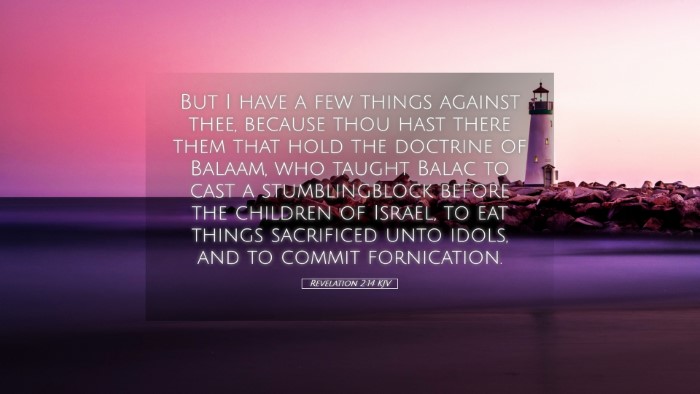Commentary on Revelation 2:14
Text of Revelation 2:14 (KJV): "But I have a few things against thee, because thou hast there them that hold the doctrine of Balaam, who taught Balac to cast a stumblingblock before the children of Israel, to eat things sacrificed unto idols, and to commit fornication."
Introduction
The book of Revelation is filled with profound symbolic meanings and addresses specific issues within early Christian communities. In this verse, Christ addresses the church in Pergamos, highlighting their spiritual struggles and the danger posed by false teachings.
Contextual Analysis
Historical Background: The church in Pergamos was situated in a city known for its cultural prowess and religious plurality. It hosted several temples and idol worship, putting the church in a challenging position as it tried to retain its Christian identity amidst pervasive paganism.
Insights from Matthew Henry
According to Matthew Henry, the reference to Balaam symbolizes the seduction that false teachings can create among believers. Balaam, known for leading Israel astray through worldly allurements, serves as a cautionary figure in this admonition. Henry emphasizes that the followers of Christ must be vigilant against teachings that compromise their faith.
- Stumbling Blocks: Balaam’s advice led to Israel's downfall by encouraging them to engage in the worship of idols and immoral practices; similarly, the church in Pergamos faced internal conflicts due to the acceptance of such doctrines.
- Idolatry and Immorality: The mention of idolatry and fornication points to a broader issue affecting the community where pagan practices infiltrated church life, contrasting with the call to holiness.
Insights from Albert Barnes
Albert Barnes notes that this verse serves as a strong condemnation of those within the church who have adopted these erroneous teachings. He explains the dual nature of the error as both spiritual and moral, warning against the encroachment of secular philosophies into the sacred.
- Doctrine of Balaam: Barnes highlights how Balaam's influence represents a type of compromise that can lead to broader ethical failings within the church.
- Consequences of Compromise: The acceptance of such teachings does not merely reflect theological error but results in serious moral implications for the believers, affecting both their witness and relationship with God.
Insights from Adam Clarke
Adam Clarke provides a detailed exposition of the historical and theological implications of the verse. He underscores the significance of Balaam in biblical history, interpreting him as a figure representing greed and disobedience. Clarke warns pastors and theologians of the dangers inherent in tolerating compromised teachings.
- Spiritual Adultery: Clarke interprets the phrase “commit fornication” as indicative of spiritual unfaithfulness, where the church aligns itself with the values of the surrounding culture instead of adhering to Christ's teachings.
- Call to Repentance: The text admonishes the church to recognize and renounce any such practices, urging a return to pure doctrine and integrity in faith.
Theological Reflections
This verse serves as a profound reminder of the importance of maintaining doctrinal purity. The reference to Balaam highlights the dangers of compromise, both in belief and practice, challenging churches to evaluate their own associations and influences.
- The Doctrine of Balaam: It invites reflection on contemporary issues where the church today may similarly be tempted to merge beliefs and practices with cultural norms at the expense of biblical truth.
- Pastoral Responsibility: Pastors must be diligent in teaching sound doctrine and guarding against influences that could lead congregations astray.
Practical Application
For modern believers, Revelation 2:14 serves as a call to vigilance and discernment.
- Evaluate Influences: Believers should critically evaluate the teachings and doctrines they embrace, ensuring they align with the teachings of Scripture.
- Community Accountability: Foster an environment of transparency and accountability within church communities to address any drift towards unhealthy teachings.
Conclusion
The challenges faced by the church in Pergamos echo throughout history and into contemporary faith communities. Revelation 2:14 serves as both a warning and a clarion call for believers to remain faithful to the teachings of Christ, guarding against the pervasive influences of worldly ideologies and practices.


